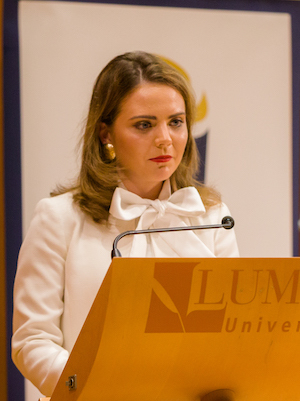Rafaella Mary Ní Seanlaíoch
A native of County Galway, Rafaella Mary Ní Seanlaíoch is a law and theology graduate student working in media production. In the summer of 2016, Rafaella was awarded an LL.B. from the University of London International Programs Law. In 2018, she completed a Master of Theological Studies from the Pontifical John Paul II Institute for Studies on Marriage and Family in Washington, D.C. Rafaella is currently in the process of creating a television series called The Heir – a historical drama telling the story of the last reigning Emperor and King of Austria-Hungary and his family.

Good evening, everyone. My name is Rafaella Mary Ní Seanlaíoch. I am from County Galway, Ireland – and I am recent law and theology graduate working in media production. I am so pleased to be with all of you today.
I was fortunate to grow up in a household where both parents, and the religious that accompanied us, provided me with an upbringing that conferred a deep understanding of faith, culture, and family. This education, which fostered my individuality, has inspired me to always strive for sanctity (regardless of how many failures I experience daily). Looking to Saint Augustine, and realizing that our hearts are restless until they rest in God, I am convinced that it is only in Christ that we become who we are. And so it has been for me, and continues to be.
Growing up in the rural west of Ireland, the ruins of a twelfth-century Cistercian Abbey amidst a wild and rugged landscape was only a short walk away from my family home. Playing inside those walls, pondering the society that existed there up until its dissolution, left deep impressions on me. Marvelling at the beauty that surrounded me ignited an ardent desire to know the creator of it. Those walks, and even the time playing there, transformed into a meditation of those ‘higher things’.
The encounter with beauty -- even in those seemingly ordinary days of play in my childhood -- led me then -- and still leads to me to God. This was consistently emphasized in my family home. From discussing family history at the dinner table, to praying the rosary on family car trips, the life of our family’s ‘domestic Church’ always pointed to God through our experiences together.
As I imagine is the case for all people -- young or old -- I have had experiences of great difficulty and great joy in my life -- which in their own ways, have paved the path I feel I am walking. When I was 13 years old, I fell ill with transverse myelitis and couldn’t walk. I was thrust into the depths of the faith that enveloped me growing up. Suddenly, I understood that suffering and sacrifice is made beautiful only in and through Christ. Even by my little suffering, I realized that as Christ surrendered Himself to the Father’s will in a total gift of Self, we are called to imitate Him in this call to giftedness. I don’t consider it coincidence at all that during my illness, I was brought to the feet of Our Lady. She perfected self-giftedness by way of her ‘fiat’ – and this is a response I try to re-issue every day of my life.
A book that has had a profound influence on me is Chesterton’s classic, What’s Wrong with the World? — a title that admittedly seems a little curious to bring up when considering the renewal of the Church’s ‘positive’ contributions to the young people of the world!
As I am sure many here know, the answer to the question posed in the book’s title is that we do not seek the good, which is ultimately the search for truth that enables authentic human freedom. The crisis, for Chesterton, was wrapped in a relativism that, though it promises a kind of ‘freedom’, falls well short of our call to be saints. It is a confused notion of freedom that is at the rotten core of the problems of our times. True freedom, as Pope John Paul II explained, ‘consists not in doing what we like, but in having the right to do what we ought.’ Knowing what we ought to do and doing what we can to follow it through, is true freedom because it transforms us into who we are called to be.
As I think about the present-day and the challenges and opportunities for the Church’s engagement of young people, I think of Chesterton’s quote: “Men have not got tired of Christianity; they have never found enough Christianity to get tired of.” To know who we are and what we ought to do, we must turn to the person of Christ and live our ‘fiats’, our call to giftedness. It is only in Christ that we find true freedom, love, peace, and fulfilment. It is in the Sacred Heart that we find our rest. Indeed, ‘man cannot fully find himself unless he makes a sincere gift of himself’.
At the beginning of this Synod, I pray and hope for a return to the freedom and flourishing promised in a personal relationship with Jesus Christ. Our road to salvation, true freedom, is through the pillars of devotion to the Blessed Virgin Mary (the New Eve) and the Eucharist. We as young people long to be our authentic selves. I firmly believe that we will never know ourselves as we are -- wonderfully and fearfully made in the image and likeness of a loving God -- without this friendship. The acceptance of this truth, postulated by way of the Church’s tradition throughout the centuries, is the true value of my meditative steps in the ruins of that 12th century abbey – and I pray, will remain with me during all the steps I take in life.
